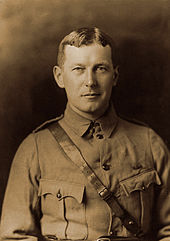The first tentative efforts to comprehend the meaning and consequences of modern warfare began during the initial phases of the war, and this process continued throughout and after the end of hostilities.
Memorials
Memorials were erected in thousands of villages and towns. Close to battlefields, the improvised burial grounds were gradually moved to formal graveyards under the care of organisations such as the Commonwealth War Graves Commission, the American Battle Monuments Commission, the German War Graves Commission and Le Souvenir français. Many of these graveyards also have central monuments to the missing or unidentified dead, such as the Menin Gate memorial and the Thiepval Memorial to the Missing of the Somme.
On 3 May 1915, during the Second Battle of Ypres, Lieutenant Alexis Helmer was killed. At his graveside, his friend John McCrae, M.D., of Guelph, Ontario, Canada wrote the memorable poem In Flanders Fields as a salute to those who perished in the Great War. Published in Punch on 8 December 1915, it is still recited today, especially on Remembrance Day and Memorial Day.


No comments:
Post a Comment